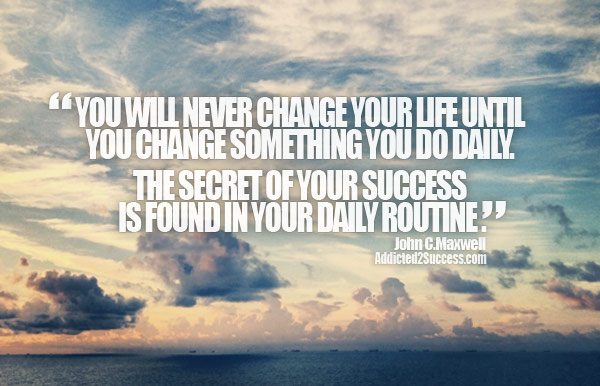Success Advice
5 Ways To Trick Your Inner Critic
Let’s talk about the oppression of our minds. How our minds end up screwing everything up, when we don’t want it to.
In my own life, I know that my worst foe is my inner critic. Maybe you’ve dealt with this inner critic. This voice that seems to pop up out of nowhere, all of a sudden you feel like you’re on fire, and BOOM!
You burst, and you don’t know what happened.
What is this inner critic? Well, it’s really just your ego trying to protect you from something that it’s not sure about. Anything that you do that is a little beyond your comfort zone is the perfect opportunity for that inner critic to creep in.
These unconscious tapes are playing over and over again in your mind like a tape recorder. A lot of people will tell you, “Oh, just ignore it!” Yeah, well how does that work, right?
How do you just ignore it? It’s not possible. For instance, my inner critic used to come up most when I was auditioning for big musicals in NYC. I’d get in the room and start shaking. Pretty embarrassing!
Why? I was trying to ignore the inner critic. I was trying to ignore the nerves. Nope. Doesn’t work. Those nerves are real, it’s how you use them that counts.
The second thing that doesn’t work, is trying to fight it. Trying to beat it out by saying, “Oh, no. I’m not nervous. No, I’m not nervous. I’m not nervous!!!!!”
“There is nothing either good or bad, but thinking makes it so.” – William Shakespeare
Think of a bird trapped in a cage. If it wants to get out, it’s going to rattle that cage more and more and more. Sometimes you just have to open up the cage and let the bird out.
So, how do we do that?
Well, we have to give it a new brain! We have to give this inner critic a new way of thinking. This critic in your brain needs a new pattern.
You have to interrupt the brain, put something else in, and change the way that your inner critic sounds. Instead of drinking the gasoline of negative self talk and lighting yourself on fire, I want you to light your inner critic on fire so you can live your light.
I’m going to give you 5 ways to bust through this inner critic, and they get a little more fun as you go.
1. Observe your thoughts
The first one comes from the Buddhists, and they always say to watch your thoughts as if they are clouds passing by.
Now that’s great, but it’s also really hard; especially if you’re in this high pressure cooker situation where you can’t passively watch your thoughts go by, right? You have big things to accomplish. And often they have to be done quick and well.
Here’s another way…
2. Connect to the present
Come back to the present moment. Say, “I’m here.” Just come back. Come back to the now. These thoughts are taking you out of the present moment so you don’t know where you are anymore. Once you get untangled from your mind, you’re more free to think clearly.
If that doesn’t work, which sometimes it doesn’t…

3. Slow your phrase down
Normally, there’s a phrase that’s coming up for your inner critic. Mine is normally, “I’m not ready. I’m not ready. I’m not ready.” Eight percent of the time this phrase is really fast.
Think about your phrase right now. Say it in your head. It’s probably really fast, right? That gives your body a certain neurological response- so slowwwwww it down. “I’m (big pause) Not (bigger pause) Ready (biggest pause).”
It sounds kind of funny, right? It will make you laugh. That’s the point! That starts tripping up the wiring in your brain. It’s like, “Whoa, whoa, whoa, wait. Why are we going slow all of a sudden?”
Now if that doesn’t work…
4. Give it a funny voice
What’s your favorite cartoon character? Let’s say it’s Mickey Mouse. So put on your best falsetto, “Hey folks! I’m not ready!” That will really crack you up if you’re a guy! Again, you’re tripping up the brain.
Finally, if that doesn’t work…
5. Break your state
Do something ridiculous! Break your physical pattern, somehow. Maybe you jump up and down and start screaming, “I’m amazing! I’m amazing! I’m amazing! Yeah!” Something like that!
“Our greatest foes, and whom we must chiefly combat are within.” – Cervantes
So there you have it, 5 ways to bust through your inner critic. This is really important because I want to see you do those things that you’re meant to do. The main thing holding us back is this voice inside of our heads that produces fear.
Anything is achievable if you really put your mind to it, but only if your mind doesn’t put you to it.
So, my questions for you are:
1.) How does this inner critic show up in your life?
2.) How is this inner critic holding you back?
3.) Which technique can you try to light fire to that inner critic?
Let me know in the comments below. Live your love and spread your light.
Did You Know
This Move Can Help You Keep More of Your Income
What if keeping more of your income wasn’t about earning more, but choosing a smarter place to live?

Living more cheaply often makes the biggest difference when money is tight. If rent feels too heavy or bills climb faster than expected, changing where you live might help a lot. (more…)
Business
How to Build a Brand That Actually Connects (For Businesses of Any Size)
Brand growth in 2026 isn’t about shouting louder; it’s about clarity, consistency, and human connection that customers genuinely trust.

In the middle of a busy workday, it’s easy to view brand building as a luxury. Honestly, we often treat it like a coat of paint we apply after the house is built. But as we navigate the landscape of 2026, it’s become clear that branding is actually the foundation. (more…)
Business
High Stakes Leadership Habits That Work in Any Business
When volatility is normal and pressure is constant, energy sector leadership reveals the habits that help entrepreneurs build trust, adapt fast, and execute with long-term focus.

Oil and gas leaders operate in a world where mistakes can prove to be very costly. Here, timelines are tight and risks are as real as can be. As a result of all this, the sector offers useful lessons for entrepreneurs and business owners. (more…)
Shift Your Mindset
SEO Secrets That Separate Struggling Hustlers from Thriving Winners
Zero-click searches and AI Overviews are crushing old tactics – the brands building unshakable SEO authority are pulling ahead fast.

One guy pours endless hours into blog posts, tweaking meta tags, begging for links – traffic flatlines. Another quietly builds something solid, updates once a quarter with fresh proof, gets cited in AI answers… and suddenly leads roll in without him lifting a finger for ads. (more…)
-

 Business4 weeks ago
Business4 weeks agoThe Salary Shift Giving UK Employers An Unexpected Edge
-

 Business3 weeks ago
Business3 weeks agoWhy Entrepreneurs Should Care About AI Automation Testing
-

 Business4 weeks ago
Business4 weeks agoWhy Smart FMCG Entrepreneurs Outsource What They Can’t Automate
-

 Business3 weeks ago
Business3 weeks agoWhat Every Business Owner Should Know Before Investing in API Integration
-

 Did You Know4 weeks ago
Did You Know4 weeks agoThe SEO Traps Even Experienced Marketers Fall Into
-

 Business3 weeks ago
Business3 weeks agoWhy Smart Entrepreneurs Are Quietly Buying Gold and Silver
-

 Business2 weeks ago
Business2 weeks agoHow Smart Brands Use Instagram Data to Outperform Competitors
-

 Business3 weeks ago
Business3 weeks agoThe Paradox of Modern Work: Can Tech Make Us More Human?





























5 Comments